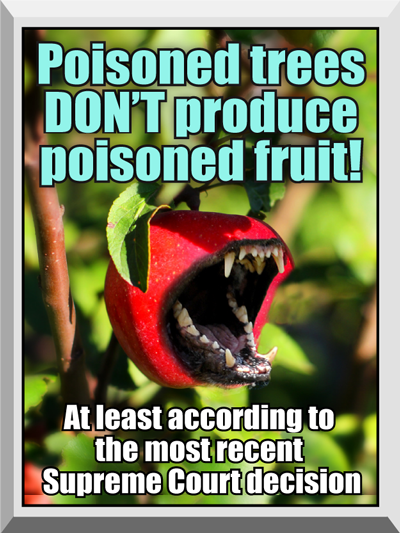
 Once upon a time there was a king who felt sure some of his subjects were breaking the law, but he wasn’t exactly sure which ones. “I’ll search everyone!” said the king. “If they’ve done something illegal I’ll slap them in the stocks. If not, I’ll let them go.” The king set about his plan but was stopped by the Supreme Wizards who told him that, even in his own kingdom, he couldn’t just go around randomly searching peasants. They were protected, said the Wizards, by a powerful shield called the “Constitution” and the only weapon the king had against it was the magic of “Probable Cause”. The Wizards cast a powerful spell to bind the king, declaring that knights had to say those magic words before searching anyone. “Screw ye that!” said the king, and told the knights to search any peasants they damn well pleased, especially the black and brown ones. Years later the Supreme Wizards returned to the kingdom, but this time the powerful shield of the Constitution had weakened and they saw things differently. “What were we thinking?” they said. “Forget about that magic mumbo-jumbo. Go ahead and search who you want and we’ll probably be fine.” The king, if not the kingdom, lived happily ever after.
Once upon a time there was a king who felt sure some of his subjects were breaking the law, but he wasn’t exactly sure which ones. “I’ll search everyone!” said the king. “If they’ve done something illegal I’ll slap them in the stocks. If not, I’ll let them go.” The king set about his plan but was stopped by the Supreme Wizards who told him that, even in his own kingdom, he couldn’t just go around randomly searching peasants. They were protected, said the Wizards, by a powerful shield called the “Constitution” and the only weapon the king had against it was the magic of “Probable Cause”. The Wizards cast a powerful spell to bind the king, declaring that knights had to say those magic words before searching anyone. “Screw ye that!” said the king, and told the knights to search any peasants they damn well pleased, especially the black and brown ones. Years later the Supreme Wizards returned to the kingdom, but this time the powerful shield of the Constitution had weakened and they saw things differently. “What were we thinking?” they said. “Forget about that magic mumbo-jumbo. Go ahead and search who you want and we’ll probably be fine.” The king, if not the kingdom, lived happily ever after.
We’re telling you this story because if you listen to the Corporate Sludgepump you may not have heard that our own Supreme Wizards recently defiled our own Kingdom in much the same way. When it comes to the admissibility of evidence, the “fruit of a poisoned tree” doctrine has held since 1920, which says that is the source of the evidence is poisoned then nothing that comes from that source is admissible in court. This rule was a sensible way to protect our 4th amendment rights against unreasonable search, but in a 5-3 decision in Utah v. Strieff, the Supremes turned that completely on its ear. They decided that a search without probable cause was just peachy as long as it turned up something actionable… drugs, outstanding warrants, anything. Goodbye 4th Amendment.
Aside from the basic facts of this latest Supreme Abomination, why should you be Furious about this? Because they aren’t even pretending anymore.
Justice Sotomayor’s Ringing Dissent
By Matt Ford in The Atlantic, Jun 2016
The U.S. Supreme Court weakened the Constitution’s protections against unlawful police stops on Monday, ruling that evidence found during those interactions could be used in court if the officers also found an outstanding arrest warrant along the way. Justice Clarence Thomas, writing for a five-justice majority in Utah v. Strieff, concluded that a Utah police officer’s “errors in judgment hardly rise to a purposeful or flagrant violation of [Edward] Strieff’s Fourth Amendment rights.” But in a thundering dissent, Justice Sonia Sotomayor was less forgiving. “The Court today holds that the discovery of a warrant for an unpaid parking ticket will forgive a police officer’s violation of your Fourth Amendment rights,” she wrote, joined by Justice Ruth Bader Ginsburg. “Do not be soothed by the opinion’s technical language: This case allows the police to stop you on the street, demand your identification, and check it for outstanding traffic warrants—even if you are doing nothing wrong.”
How the Latest SCOTUS Ruling Affects Your Fourth Amendment Rights
By Aimee Kuvadia on attn..com, Jun 2016
In a 5-3 decision Monday, the Supreme Court ruled that evidence discovered in a search by police during unlawful stops can be used in court, so long as police officers conducted the search only after learning the person had an outstanding warrant. Writing for the majority, Justice Clarence Thomas said that a police officer’s “negligence” in making a stop without reasonable suspicion should not preclude the defendant from being charged with a drug offense…
Supreme Court ruling weakens crucial protection for us all
By Phillip Holloway in the St. Louis American, Jun 2016
When I graduated from the police academy in 1988, I left knowing that police officers are limited by no less authority than the Constitution of the United States in just how and when we could stop a citizen and conduct an investigation. The instructors were quite clear: “You cannot lawfully stop someone unless you have at least ‘reasonable articulable suspicion.'” They further warned that if you as a police officer don’t have that level of suspicion, any evidence you collect will be inadmissible in court. This was the same law I learned in my criminal procedure course in law school, the same thing that I have taught to undergraduate criminal justice students and to police, and the same law I have applied in court as a prosecutor and as a criminal defense attorney.
Supreme Court Says Illegal Police Stops Are OK as Long as They Find an Outstanding Warrant Afterward
Kevin Drum in Mother Jones, Jun 2016
A couple of days ago the Supreme Court released its opinion in Utah v. Strieff. The facts of the case are pretty simple. Working from an anonymous tip about drug dealing, a police detective staked out a house and then randomly detained a man named Edward Strieff as he was leaving. He had no probable cause to do this, but he did it anyway. Then he demanded Strieff’s ID, ran a background check, and discovered that Strieff had an outstanding warrant for a traffic violation. Bingo. That was enough to arrest him and conduct a search, which turned up some meth…
‘We the Prisoners’: The Demise of the Fourth Amendment
By John Whitehead on The Rutherford Institute, Jun 2016
In a carceral state—a.k.a. a prison state or a police state—there is no Fourth Amendment to protect you from the overreaches, abuses, searches and probing eyes of government overlords. In a carceral state, there is no difference between the treatment meted out to a law-abiding citizen and a convicted felon: both are equally suspect and treated as criminals, without any of the special rights and privileges reserved for the governing elite. In a carceral state, there are only two kinds of people: the prisoners and the prison guards…
How Two Recent Supreme Court Decisions Nullify Your Constitutional Rights
By Derrick Broze in MintPressNews, Jun 2016
Since the 1914 case Weeks v. United States, the Supreme Court has interpreted the 4th Amendment to mean that evidence obtained through a violation of the Fourth Amendment is inadmissible in court. According to the Supreme Court’s more liberal judges, this ruling could set a dangerous new precedent. Justice Sonia Sotomayor called the decision a threat to constitutional rights. “The court today holds that the discovery of a warrant for an unpaid parking ticket will forgive a police officer’s violation of your Fourth Amendment rights,” Sotomayor wrote with Justice Ruth Bader Ginsburg. “Do not be soothed by the opinion’s technical language: This case allows the police to stop you on the street, demand your identification and check it for outstanding traffic warrants — even if you are doing nothing wrong.”
Utah v. Strieff- Amicus Brief by ACLU










